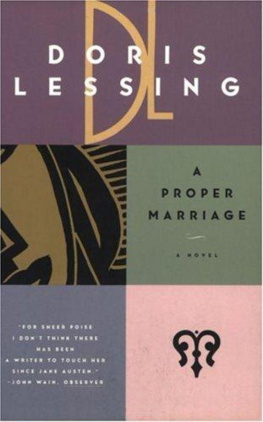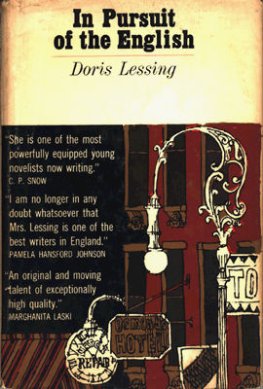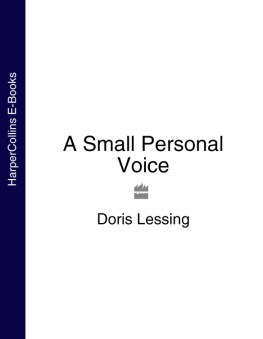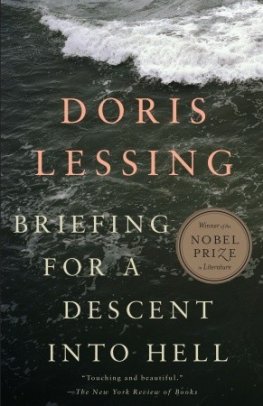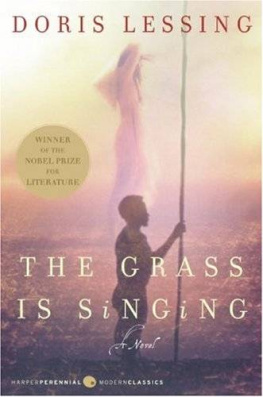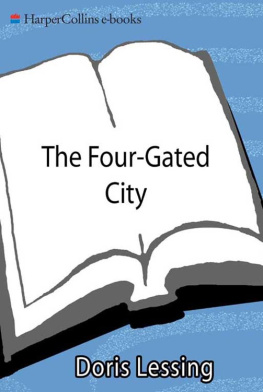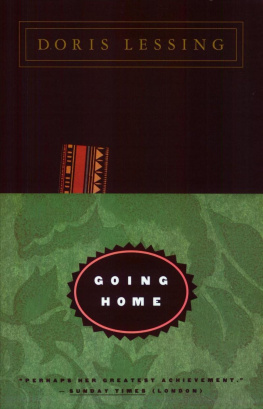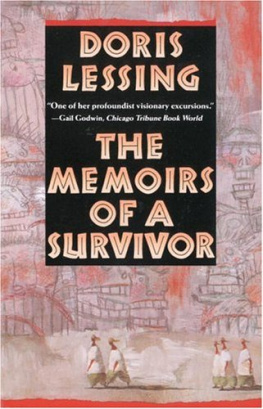
Praise for
Doris Lessings Novella
Lessing sets the scene instantly, viscerally, and explores the folds and recesses of character with astonishing economy.
Boston Globe
[Lessing] has a seismographers feel for the fissures beneath the surface of family and for the tension between personal yearning and societys conventions.
Milwaukee Journal Sentinel
Intensely readable.... [Lessing] offers startling perspectives on domesticity and desire.
O, The Oprah Magazine
Powerful... beautifully realized.
Miami Herald
A keen sociological eye for class and ideology; an understanding of the contradictory impulses of the human heart; an ability to conjure a place, a mood, and a time through seemingly matter-of-fact descriptions.
Michiko Kakutani, New York Times
Stunning... showing Lessings trademark incisiveness.
Vogue
Lessing is an incisive chronicler of our times and a wickedly honest storyteller.
New Orleans Times-Picayune
At once intimately detailed yet infinitely expansive in the suggestions of a lost world only recoverable by a profoundly observant writer... showing [Lessing] at the top of her very impressive form.
Publishers Weekly
Brilliantly written.... Lessing is at the top of her game.
Library Journal (starred)
O n either side of a little promontory loaded with cafs and restaurants was a frisky but decorous sea, nothing like the real ocean that roared and rumbled outside the gape of the enclosing bay and barrier rocks known by everyone and it was even on the charts as Baxters Teeth. Who was Baxter? A good question, often asked, and answered by a framed sheet of skilfully antiqued paper on the wall of the restaurant at the end of the promontory, the one in the best, highest and most prestigious position. Baxters, it was called, claiming that the inner room of thin brick and reed had been Bill Baxters shack, built by his own hands. He had been a restless voyager, a seaman who had chanced on this paradise of a bay with its little tongue of rocky land. Earlier versions of the tale hinted at pacific and welcoming natives. Where did the Teeth come into it? Baxter remained an inveterate explorer of nearby shores and islands, and then, having entrusted himself to a little leaf of a boat built out of driftwood and expertise, he was wrecked one moony night on those seven black rocks, well within the sight of his little house where a storm lantern, as reliable as a lighthouse, welcomed in ships small enough to get into the bay, having negotiated the reef.
Baxters was now well planted with big trees that sheltered tables and attendant chairs, and on three sides below was the friendly sea.
A path wandered up through shrubs, coming to a stop in Baxters Gardens, and one afternoon six people were making the gentle ascent, four adults and two little girls, whose shrieks of pleasure echoed the noises of the gulls.
Two handsome men came first, not young, but only malice could call them middle-aged. One limped. Then two as handsome women of about sixty but no one would dream of calling them elderly. At a table evidently well-known to them, they deposited bags and wraps and toys, sleek and shining people, as they are who know how to use the sun. They arranged themselves, the womens brown and silky legs ending in negligent sandals, their competent hands temporarily at rest. Women on one side, men on the other, the little girls fidgeting: six fair heads? Surely they were related? Those had to be the mothers of the men; they had to be their sons. The little girls, clamouring for the beach, which was down a rocky path, were told by their grandmothers, and then their fathers, to behave and play nicely. They squatted and made patterns with fingers and little sticks in the dust. Pretty little girls: so they should be with such good-looking progenitors.
From a window of Baxters a girl called to them, The usual? Shall I bring your usual? One of the women waved to her, meaning yes. Soon appeared a tray where fresh fruit juices and wholemeal sandwiches asserted that these were people careful of their health.
Theresa, who had just taken her school-leaving exams, was on her year away from England, where she would be returning to university. This information had been offered months ago, and in return she was kept up to date with the progress of the little girls at their first school. Now she enquired how school was going along, and first one child and then the other piped up to say their school was cool. The pretty waitress ran back to her station inside Baxters with a smile at the two men which made the women smile at each other and then at their sons, one of whom, Tom, remarked, But shell never make it back to Britain, all the boys are after her to stay.
More fool her if she marries and throws all that away, said one of the women, Roz in fact Rozeanne, the mother of Tom. But the other woman, Lil (or Liliane), the mother of Ian, said, Oh, I dont know, and she was smiling at Tom. This concession, or compliment, to their, after all, claim to existence, made the men nod to each other, lips compressed, humorously, as at an often-heard exchange, or one like it.
Well, said Roz, I dont care, nineteen is too young.
But who knows how it might turn out? enquired Lil, and blushed. Feeling her face hot she made a little grimace, which had the effect of making her seem naughty, or daring, and this was so far from her character that the others exchanged looks not to be explained so easily.
They all sighed, heard each other and now laughed, a full frank laugh that seemed to acknowledge things unsaid. One little girl, Shirley, said, What are you laughing at? and the other, Alice, Whats so funny? I dont see anything funny, and copied her grandmothers look of conscious naughtiness, which in fact had not been intended. Lil was uncomfortable and blushed again.
Shirley persisted, wanting attention, Whats the joke, Daddy? and at this both daddies began a tussling and buffeting of their daughters, while the girls protested, and ducked, but came back for more, and then fled to their grandmothers arms and laps for protection. There they stayed, thumbs in their mouths, eyes drooping, yawning. It was a hot afternoon.
A scene of somnolence and satisfaction. At tables all around under the great trees similarly blessed people lazed. The seas all around them, only a few feet below, sighed and hissed and lapped, and the voices were low and lazy.
From the window of Baxters Theresa stood with a tray of cool drinks momentarily suspended and looked out at the family. Tears slid down her cheeks. She had been in love with Tom and then Ian, and then Tom again, for their looks and their ease, and something, an air of repletion, as if they had been soaking in pleasure all their lives and now gave it out in the form of invisible waves of contentment.
And then the way they handled the little girls, the ease and competence of that. And the way the grandmothers were always available, making the four the six... but where were the mothers, children had mothers, and these two little girls had Hannah and Mary, both startlingly unlike the blonde family they had married into, being small and dark, and, while pretty enough, Theresa knew neither of them was good enough for the men. They worked. They owned a business. That is why the grandmothers were so often here. Didnt the grandmothers work, then? Yes, they did but were free to say, Lets go to Baxters and up here to Baxters they came. The mothers too, sometimes, and there were eight.
Theresa was in love with them all. She had at last understood it. The men, yes, her heart ached for them, but not too severely. What made the tears come was seeing them all there, watching them, as she did now. Behind her, at a table near the bar, was Derek, a young farmer who had wished to marry her. She didnt mind him, rather fancied him, but she knew that this, the family, was the real passion.
Next page

